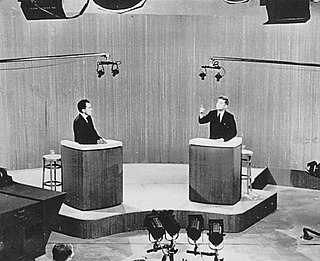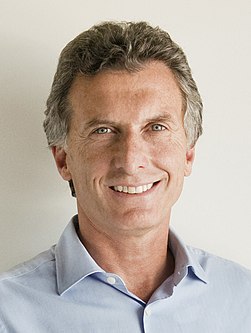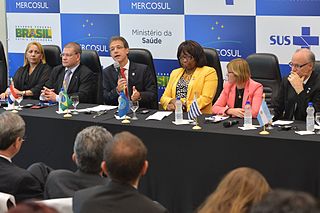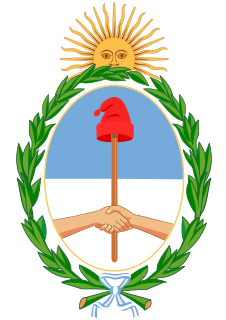
The first Presidential debate in Argentina took place during the 2015 presidential elections. There were proposals for doing so in the previous elections, but were refused by the candidates that were ahead in the polls. A controversial case took place in 1989, when Carlos Menem refused at the last moment to attend the debate with Eduardo Angeloz set by Bernardo Neustadt. The production then held a "debate" between Angeloz and an empty chair. [1]

A leaders' debate or presidential debate is a public debate held during a general election campaign, where the candidates expose their political opinions and public policy proposals, and criticism of them, to potential voters. They are normally broadcast live on radio, television and Internet. The events may be organized by media corporations or non-government organizations.
Initially, the six candidates agreed to take part in the debate. Daniel Scioli, who was ahead in the polls, refused to attend it, so the debate was held instead between the other five candidates that passed the primary elections: Mauricio Macri, Sergio Massa, Margarita Stolbizer, Nicolás del Caño and Adolfo Rodríguez Saá. It was organized by the NGO "Argentina debate".

Daniel Osvaldo Scioli is an Argentine politician, sportsman, and businessman. He was the Vice President of Argentina from 2003 to 2007, under Néstor Kirchner, and was Governor of Buenos Aires Province from 2007 to 2015. He has also served two tenures as president of the Justicialist Party. He was the candidate to the presidency for the Front for Victory ticket in the 2015 general elections, and lost to Mauricio Macri in a runoff election.

Mauricio Macri is the current President of Argentina and has been in office since 2015. A former civil engineer, Macri won the first presidential runoff ballotage in Argentina's history and is the first democratically-elected non-Radical or Peronist president since 1916. He was chief of government of Buenos Aires from 2007 to 2015, and represented the city in the lower house of the Congress of Argentina from 2005 to 2007. The reintegration of Argentina into the international community is central to Macri's agenda.

Sergio Tomás Massa is an Argentine politician who served as Chief of the Cabinet of Ministers from July 2008 to July 2009.
The general election ended with a very slight victory of Scioli over Macri, and both of them would have a runoff election. In this opportunity, Scioli finally will debate with Macri. [2]
The ballotage system is included in the Constitution of Argentina. It was added by the 1994 amendment, as part of the negotiations between Raúl Alfonsín and President Carlos Menem.













